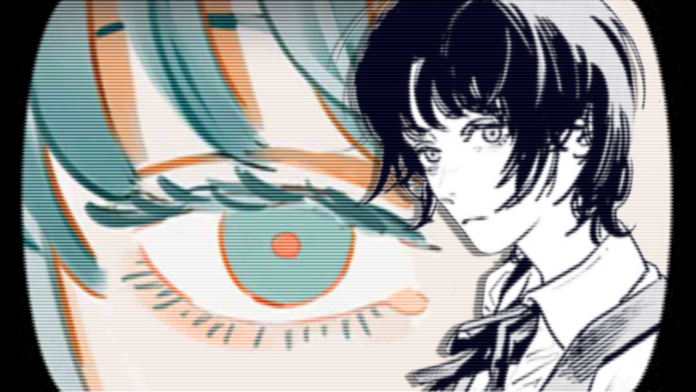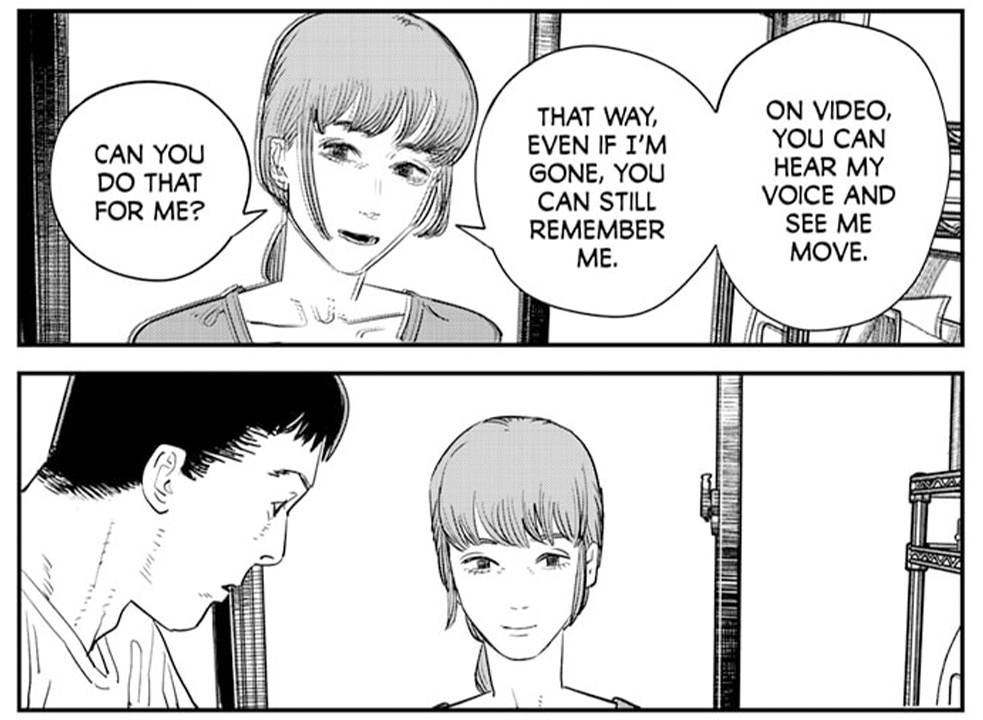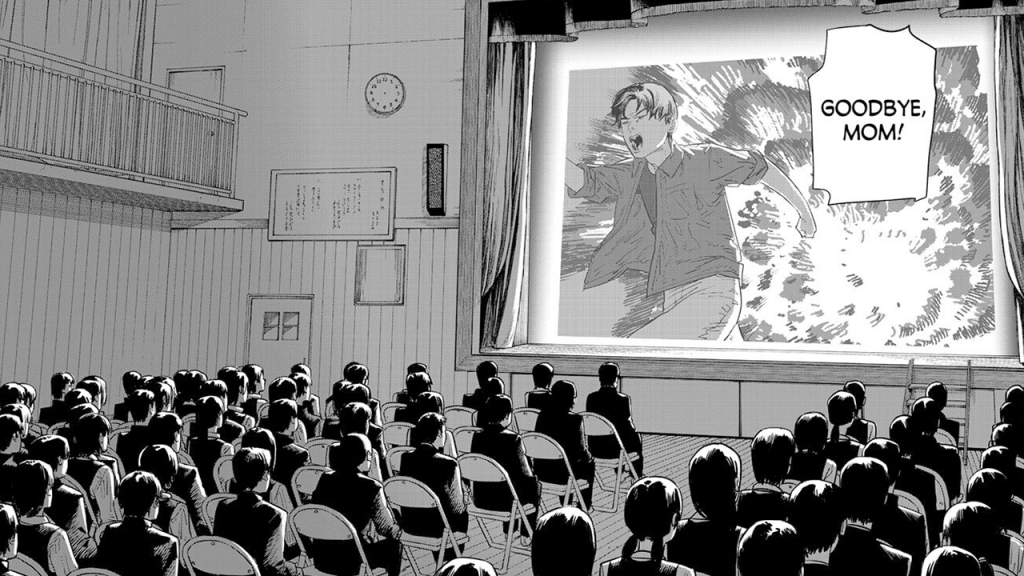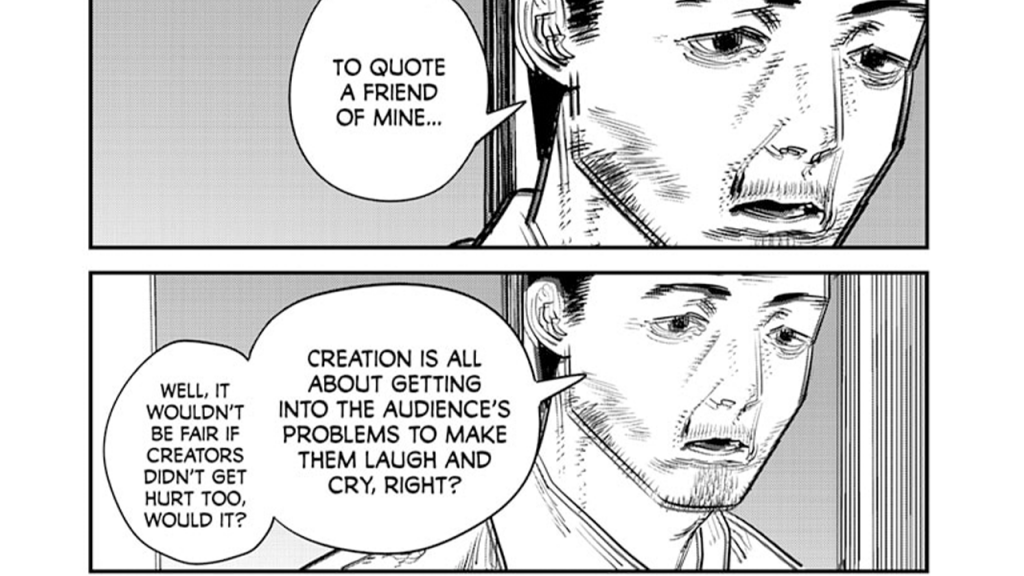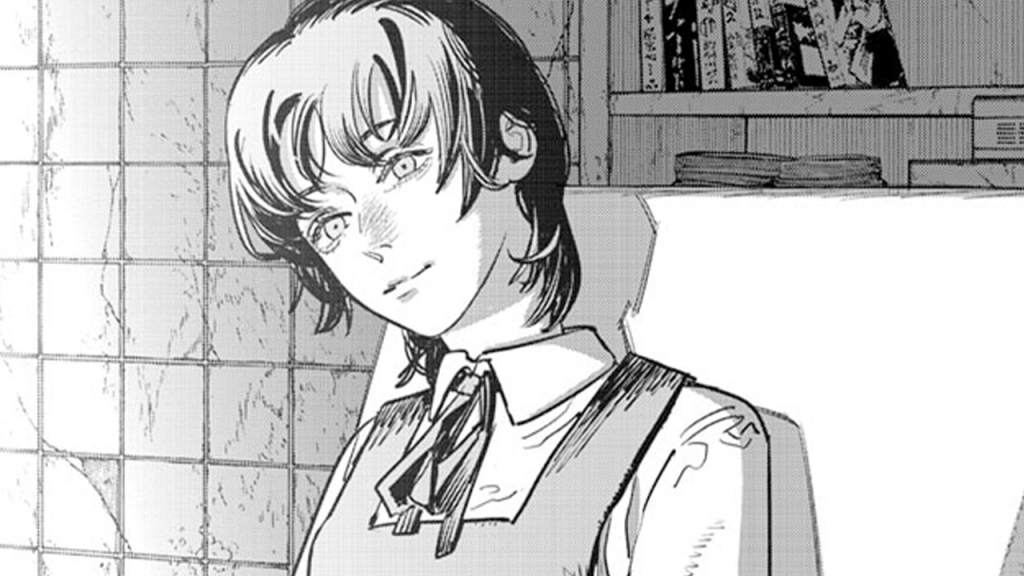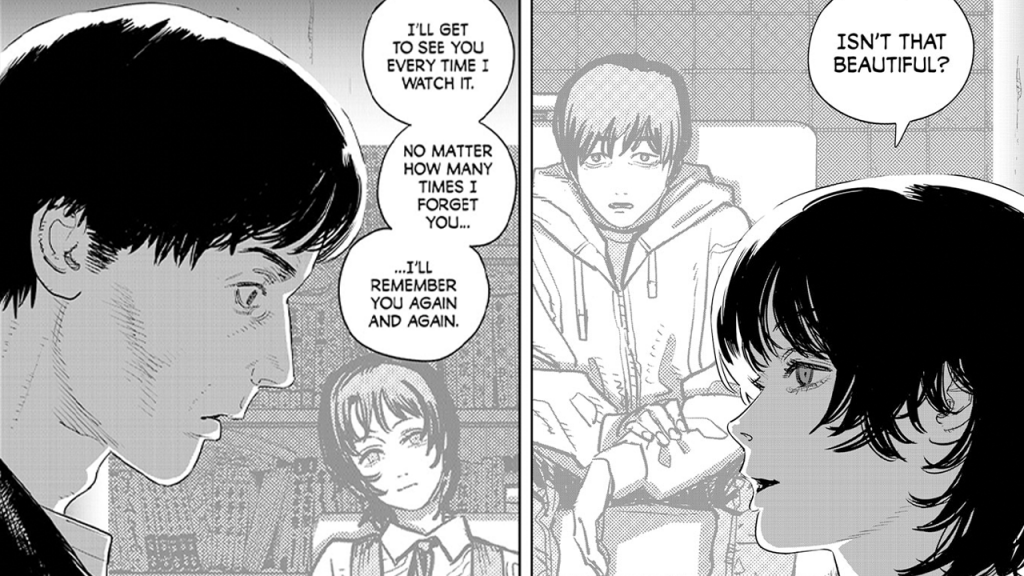Goodbye Eri is a perfect display of how media affects our perceptions of reality. Its creative use of found footage as a thematic tool, as opposed to a directorial gimmick, shows us the strength of Tatsuki Fujimoto‘s narrative skills.
Its social commentary about how we blindly let entertainment guide our emotions linger with you long after you’re done reading. Each act showcases how art is limited in how much it can express something. And as a whole, the story makes you look at the crucial role escapism plays in all our lives.
Normally I don’t bother doing spoiler warnings for reviews, but this is one of those cases where I would highly recommend you go read this one-shot manga before continuing.
Half of the enjoyment of this story is experiencing it blindly first-hand. While some elements of its plot are predictable, it’s largely the presentation and details of those twists that I think are important to feel for yourself. But I’m also not your dad so do whatever you want.
Goodbye Eri is available to read now through Viz Media.
A Found Footage Manga
Found footage is a cinematic technique that always resonated with me. Cloverfield was my first experience with that style of film, which gives you a very personal, horrific view of an unfolding giant monster disaster movie.
Its raw style made it feel like a real event by utilizing restricted film angles and sound quality along with more natural character interactions to give you a closer connection with the story. You feel the fear and confusion along with the actors as their party is interrupted and they struggle to escape the city during a terrifying alien invasion.
And that made me fall in love with this film style. Which would be solidified years later when I saw the movie Chronicle, a fantastic superhero found footage film that I would recommend everybody go watch.
But the found footage gimmick is hard to do well, and more often comes off as a cheap way to make a film appear unique than it is. Over time, this technique would find its natural home as a tool for horror movies. Because it’s easier to terrify audiences with creepy footage that looks like they could’ve filmed it themselves.
So given that this is a one-shot by the creator of Chainsaw Man, I was fully expecting this found footage manga to be some kind of twisted snuff film. Instead, it’s a psychological drama about filmmaking, and deals with meta concepts in interesting ways unique to this method of storytelling.
Thematic Framing of Goodbye Eri
Visually speaking, Goodbye Eri is simplistic yet inventive. Tatsuki Fujimoto purposely restricts his narrative to the perspective of a smartphone, ultimately reducing every page into four panels with natural angles.
In between jump cuts through hours of footage, there are many scenes with barely changed panels. And while some might think this makes it cheap, it actually works well. The subtle changes, proper pacing of expressions and dialogue, along with occasional motion blurs, make this feel legitimately like actual footage.
This became one of my favorite narratives of all time for competently accomplishing that style in a vastly different medium. Especially when it’s difficult for films to pull it off nicely.
As the story unfolds, it’s clear the found footage perspective of this manga isn’t just a neat gimmick. Rather, this decision was crucial to tell this kind of narrative in a way that properly portrays its themes about media manipulation and realism.
An Obscure Documentary
It opens with 12 year old Yuta’s birthday party as he records a video from his new smartphone. His mother is battling an illness and asks Yuta if he would record her life until she dies.
An emotional documentary follows, showing candid heart-warming shorts of the mother along with the quiet turmoil of the father. While Yuta himself struggles over his feelings with the situation. And when the fateful day inevitably comes, he can’t find it in himself to see his mom in her final moments.
Then it’s revealed that what we’re seeing is an edited film Yuta is presenting at a school festival. Which would be a decent artsy film, if he didn’t edit the finale to also have her hospital explode. A decision which he somehow thought made the film “awesome”. But like the rest of the audience, you’re left either confused or offended by this ending. And that’s just the beginning of Goodbye Eri.
What at first seems like a teenager’s awkward way to deal with grief, eventually becomes a concerning look at media manipulation and our perceptions of reality.
After Yuta’s film airs, the camera doesn’t stop. Instead, we see him interview people who all criticize the movie, along with his sense of morals. This disconnect between a content creator’s vision and audience reception drives him to attempt suicide.
Layers of Reality
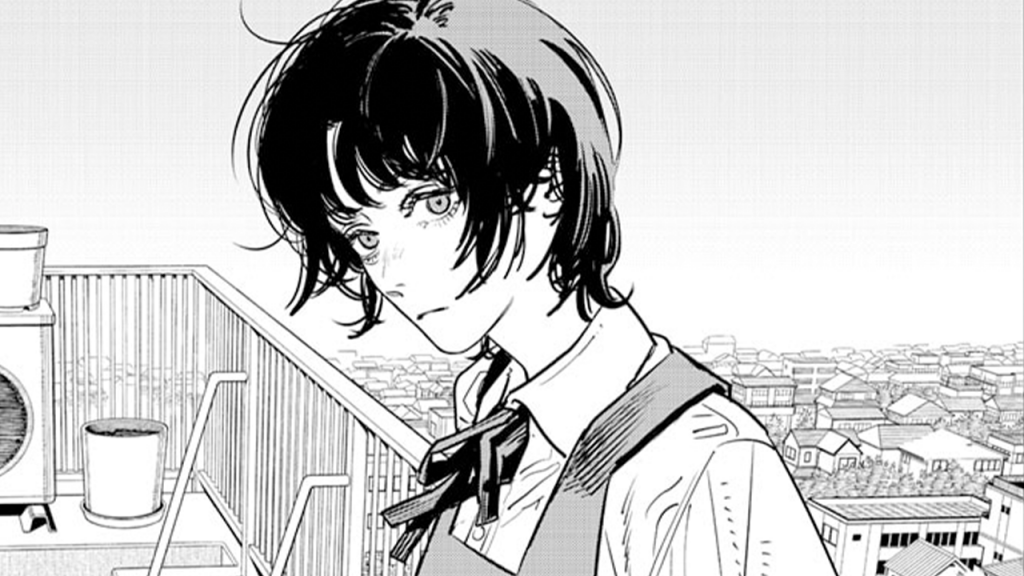
And that’s when a mysterious girl named Eri enters the picture. As the only person who understood his film, Eri helps Yuta learn about filmmaking so she can bring out his true talents as a director.
This relationship develops into an awkward film buff duo. And eventually, Yuta decides to make a meta project continuing the events of the first film. Only this time, the boy meets a vampire girl, for the bit of the fantasy spin Yuta likes to add.
And it’s this second film project that starts to distort your views and trick you emotionally. Giving us scenes that feel genuine and impactful before someone breaks character, looks at the camera, and says “so how was that take?”
And once you experience that, you can’t help but wonder if even that moment was a more meta line for another layer of the film. And by the end, the difference between fact and fiction is utterly destroyed. A big chunk of that destruction happens when we find out his mother’s film was essentially a lie.
The audience saw a heavily cherry-picked compilation of moments that made her seem kind and beautiful. But in reality, she was an exploitative and emotionally manipulative parent who made her son record her illness for clout. Yuta’s mom hated him, and only wanted to use him for her own personal gain as a TV producer.
I absolutely loved that rather than have the initial premise remain a cheesy excuse for a found footage story, Fujimoto changes the entire climate of the project with just additional character details.
An Explosive Statement
And it all comes together painfully with one deathbed scene where she calls him useless up to the last moment. Completely recontextualizing Yuta’s decision to run away and edit in the explosive finale.
He didn’t do it out of sadness and grief, he did it out of anger and resentment. It was his way of retaliating against her abusive reality all those years.
As awkward as the hospital explosion was, it was arguably the only real time we saw Yuta express how he truly feels in the first film. All the other scenes that feel like natural life are artificial snippets. And his contemplation over whether or not to be sad about his mother dying now becomes flat-out fiction.
When his father tells us that Yuta always adds a bit of fantasy into his works, we later realize that the real fantasy of his first movie wasn’t the explosion at the end. It was his mother the whole time.
That explosion is awesome to him because of how it’s a personal rejection of everything this project stood for. Yuta made everyone see the fictional version of his mother, like she wanted, and then cathartically made her explode as a giant “f*** you”.
Goodbye Eri Twists Your Emotions
Being a direct expansion of his previous film, we can see Yuta as a real person when the story keeps going. He’s an amateur artist that wants to express his vision and connect with an audience. But struggles so hard with the initial disconnection that he considers suicide after his first attempt at a movie flops.
Eri convinces him to live so he can try to develop a real passion for movies. An interest that before only seemed forced upon him by his mother.
Yet while this arc has more natural character growth for Yuta, you can tell how Eri is also manipulating him. She connected with his first film because she’s also dying and wants him to record her too. At this point though, Yuta must know he’s being baited into another illness documentary.
But the difference here is that he’s in control of the narrative. Instead of an abusive family obligation, it’s an actual exploration of a passion. A look at the beautiful side of a person he genuinely cares about, and without the need for an explosive ending.
Entertainment Versus Propaganda
The second film is also upfront with how easily a story can shift from a documentary into believable fiction. Yet this meta quality somehow never detracts from its emotional intentions despite being open with how fake it is. And this is where we get into the heart of Goodbye Eri.
All it took was certain editing decisions to morph this weird kid’s obscure trauma venting into a moving experience that can bring you to tears. So as Eri’s film is made, we’re meant to ask ourselves if even the evil perspective of Yuta’s mom is real.
Because if you can showcase someone’s best moments, you can do the same for their worst moments. And that’s especially true in today’s world of social media obsession. A time where an entire person’s life can be archived digitally and sent out into the world.
Just one out of context clip or misleading headline can change perspectives drastically. The line between reality and propaganda is blurring every day. And we choose to exist in our own worlds so we can have the lives we want.
Expressing Creative Vision
As a director, Yuta controls the camera and manipulates our lives through editing. Capable of giving us the lives we want, but forever cursed with the full context of his own perspective. Giving him a constant nagging sensation that something is missing from his films.
That’s because you will always lose something in the editing process. And even a collection of raw footage will only be just a camera’s view. It won’t record a person’s emotional state and thoughts beyond facial expressions and words.
Yuta can only portray his version of a character, never truly the person themselves. It’s for that reason that Yuta’s films will never fully convey to an audience the reality of his subjects.
Struggles of a Disconnected Director
Meanwhile, Yuta has always viewed his own life like an outsider. He’s just a character, one that has always struggled to address his problems as facts unless he’s in front of a camera. And he probably isn’t sure if those are actually his emotions or if that’s all just an act.
Having fully documented and edited the life and death of both his mother and Eri, his views of life and his ability to cope with death has been distorted. So when he loses his entire future family in an accident, he shuts down. As I’m sure anyone would.
But to him what hurts more is that disconnection with his problems. That feeling that he’s an outsider only capable of documenting. A skilled director that feels utterly powerless when it comes to his own life.
He can direct the most beautiful documentary about a loved one, preserving a version of them forever, but it will never bring them back. No matter how he portrays them, he will always have the full context and they will always still be gone. And this realization naturally drives him back to suicide.
Surreal Reunions with Vampires
Yuta records one last goodbye before heading back to the building they would binge movies in. And that’s where he finds a young Eri, alive and well, watching the film he made about her. This final scene feels surreal due to the bizarre interaction along with the sudden shift from found footage to more traditional camera angles.
Eri was actually a vampire after all, and her death was more of a sudden removal of her memories. Only this time, her life was replaced with Yuta’s version of her. Blissfully unaware of how she was actually a “self-absorbed bitch” that people didn’t like.
And when he asks if she’ll be able to go on knowing everyone around her will die before her, Eri simply says that it doesn’t matter because she has his film now. Every time she forgets him, she’ll get to see him. And to her, that’s beautiful enough to keep going.
Eri represents how everyone has become a vampire. Turned into living corpses by clinging to memories and escapism. We detach ourselves from the dullness and hardship of our own reality and escape into fiction. Our survival is through a constant drip feed of new stories that make our life feel like more than it is. Until eventually we dream of replacing our reality.
What Eri wanted with her film wasn’t so she can bring back her memories later. It’s so that she can become Yuta’s version of those memories. An over-idealized, fantastical Eri. And even though everyone knows it’s fake, they’d rather remember that version of her.
The Message of Goodbye Eri
The message of Goodbye Eri is not about the evils that can come from escapism. Rather it’s about understanding why people cling to these narratives to begin with, even if they know it’s all fake.
Tastuki Fujimoto chooses to embrace escapism. While other stories would shame the very concept, Goodbye Eri shows us that fantasizing to ignore the complexities of reality can be crucial to our mental well being. As directly apparent by Yuta’s suicidal tendencies when he has to face the hard truths of his life.
When you feel hopeless, go see an awesome, nonsense action movie instead. Your problem won’t go away, sure, but you’ll feel better long enough to keep going. In the end, all our lives might just need a pinch of fantasy. We can walk forward in our lives with a cool explosion behind us. Or at least that’s my takeaway.



